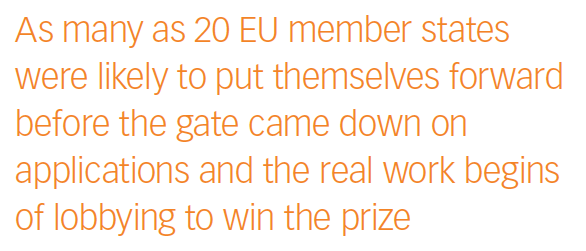Brexit and the EMA: Bidding and Betting on an Uncertain Future
Pharmaceutical Executive
A review of the top contenders to land the agency as decision on its relocation draws closer.
The end of July was the deadline for submissions from countries bidding to host the relocated European Medicines Agency (EMA) when the UK withdraws from the European Union (EU), and the competition was fierce in the final weeks of bid preparation. As many as 20 EU member states were likely to put themselves forward before the gate came down on applications and the real work begins of lobbying to win the prize-a decision scheduled to be made just a dozen or so weeks later, in November.
Netherlands
Plenty of the candidates have already set out their stalls in advance, with glossy brochures and picture-laden websites.
Among the most likely candidates, the Netherlands is stressing its ability to deliver on “commitment, continuity, connectivity, and community.” When its health minister, Edith Schippers, presented the bid in Brussels recently, she emphasized the country’s capacity to deliver a “smooth transition,” spicing up the offer with “a tailor-made building in Amsterdam’s business district,” and a beefed-up national drug evaluation board, with a promise of €10 million to expand its scientific capacity “and to help strengthen other national medicines agencies across Europe.” And anticipating the tough deal-making that will go on among heads of government as the decision is made, she warned that the EMA’s “critical work cannot be

disrupted. We cannot allow patients to pay the price for political horse-trading.”
The Dutch offer also includes a “high-quality working environment and workforce, dedicated expat centers and one of the highest concentrations of life sciences and health activities in Europe.” It flags up the region’s international credentials, advanced Internet coverage, fast rail connections, and the number of direct European connections from Amsterdam’s Schiphol airport as “superior to the agency’s current UK location.” The city’s deputy mayor even suggests that “as it is only a short distance from London, employees can, if necessary, choose to commute during the early phases. No other city can offer that level of connectivity.”
Sweden
Sweden, one of the first countries to put in a bid after the UK’s Brexit referendum, is touting the Stockholm-Uppsala region for “a seamless transition into a world-leading scientific environment, with life science collaborations between healthcare, the university sector, and industry.” It is not just keen. It is, according to its promotional material, “determined” to host the EMA, and the country’s prime minister has “written to the President of the European Council, Mr. Tusk, expressing Sweden’s wholehearted ambition to host the EMA.”
There are no limits to the optimism of Sweden’s bid. “We are certain that we are the best country to host the EMA. I am sure that we can convince the other European governments of this,” according to Minister for Social Security Annika Strandhäll. The package highlights “options for EMA headquarters in Hagastaden, Stockholm, well embedded in the life sciences center near Karolinska Institutet, one of the most renowned medical universities in the world, and the Science for Life Laboratory (SciLifeLab), an elite research center for molecular biosciences.” It emphasizes the “leading research environment,” with “some of Europe’s best researchers” and three university hospitals. Basking in a little reflected glory, it also suggests that since Stockholm is already the host to the European Center for Prevention and Disease Control, there is a chance for synergies.
It also gives close attention to personal matters, including “a housing provision service” and rapid growth of construction of new housing in the region, or “a one-stop shop, including a specially developed mobile phone application, to guide EMA employees and their families through the steps to take as they settle into life in Sweden.” And it boasts of being “within easy reach of two international airports.”
Belgium
Belgium has also thrown its hat into the ring, offering Brussels as the location. It is “the ideal place” for the EMA. The city offers “a smooth transition from London”-because Brussels is “centrally located in the heart of Europe and close to the current EMA headquarters,” so “the proximity to London and the excellent connectivity will ensure business continuity during the transition phase.” Brussels claims to provide “a stable and welcoming environment,” “outstanding quality of life” with “a reliable healthcare system, an affordable and varied real estate market, a large choice of international schools and ample employment opportunities for family members.”
The Belgian bid doesn’t hesitate to trump Stockholm’s pretensions to consolidating existing assets. Brussels, says the Belgian government, is “a perfect breeding ground for the European Medicines Agency to develop,” because of the “large availability of conference venues and hotel rooms at affordable prices,” and “the cluster effect due to the proximity of EU institutions,” which “facilitates dialogue, reduces travel expenses, and promotes synergies.”
It also invokes Belgium’s “strong reputation for R&D and innovation as well as the presence of a strong pharmaceutical sector”-“a pharmaceutical powerhouse and knowledge center.” And to reinforce its bid, Brussels also offers “99 reasons why Belgium is uniquely phenomenal”-including, alongside all the predictable stuff about Brel, Magritte, and chips with mayonnaise, the distinctly non-European boasts that “every year, we reenact the Battle of Waterloo, with over 1,000 extras,” and “the Battle of the Bulge kept the worlds in suspense.”
Other scenarios
But for all the ferocious positioning to pick up the spoils of Brexit (and these three bids were likely just the tip of the iceberg from the last few weeks), another curious possibility is starting to emerge. In the opinion of this author, the massive incoherence and incompetence at the heart of the British government is becoming increasingly clear-and the Brexit process is revealing that so much of the pro-Brexit rhetoric was no more than that-just rhetoric. Less diplomatically, the crude mendacity of the pro-Brexit campaign is now clearly on show. Two hitherto unimagined scenarios are conceivable at this stage.
One is that the UK, faced with the tough reality of negotiating withdrawal, recognizes that it has to make compromises to avoid ruining the country. Force majeure will oblige even the most ardent Brexiteers to accept a soft Brexit-which could include any number of transitional arrangements, including the retention, at least for a time, and possibly an extended time, of the EMA in London, to minimize disruption.
Another scenario is that the kamikaze politics of the hard Brexiteers leads to a complete rupture of negotiations, and the eventuality of that “no deal better than a bad deal” that the misguided Conservative party currently embraces. But by the time that happens, the torpid British public may well have started to wake up to the enormity of the losses they would face from a non-deal Brexit, and to push their elected representatives either back to the negotiating table, or even into abandoning Brexit entirely.
Amsterdam, Brussels, Stockholm and the rest may have to wait rather longer before they get their hands on the EMA.
Reflector is Pharmaceutical Executive’s correspondent in Brussels

FDA Outlines Updated Requirement for Placebo-Controlled Trials in Vaccine Research
May 21st 2025In an article recently published by The New England Journal of Medicine, FDA higher-ups Vinay Prasad, MD, MPH; and Martin A. Makary, MD, MPH, wrote that any new COVID-19 vaccine must now be evaluated in placebo-controlled studies.
Navigating Distrust: Pharma in the Age of Social Media
February 18th 2025Ian Baer, Founder and CEO of Sooth, discusses how the growing distrust in social media will impact industry marketing strategies and the relationships between pharmaceutical companies and the patients they aim to serve. He also explains dark social, how to combat misinformation, closing the trust gap, and more.